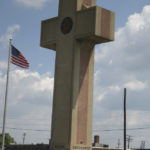 “On Feb. 27, the Supreme Court [heard] arguments about the constitutionality of the 40-foot Peace Cross on government property in Bladensburg, Md., a memorial for local fallen World War I soldiers. Many Americans might see a case like this and assume that keeping the cross means solidifying Christianity’s dominance in American society. To the contrary, protecting these symbols helps religious diversity, because getting rid of the cross also means getting rid of the government accommodations and acknowledgments that religious minorities need in order to thrive.”
“On Feb. 27, the Supreme Court [heard] arguments about the constitutionality of the 40-foot Peace Cross on government property in Bladensburg, Md., a memorial for local fallen World War I soldiers. Many Americans might see a case like this and assume that keeping the cross means solidifying Christianity’s dominance in American society. To the contrary, protecting these symbols helps religious diversity, because getting rid of the cross also means getting rid of the government accommodations and acknowledgments that religious minorities need in order to thrive.”
— Asma T. Uddin, Why keeping the 40-foot Peace Cross might be good for religious minorities, Religious Freedom Center / Freedom Forum Institute
More headlines on this issue:
- Justices to consider constitutionality of cross-shaped war memorial on public land: In Plain English
- Supreme Court argument to consider: Is a memorial cross a religious symbol?
- Another ‘cross’ case could undermine our separation of church and state
- High court’s cross case could affect monuments nationally
- Op-ed: Government’s views on cross are offensive to Christians and Jews alike
- In Bladensburg Peace Cross case, Supreme Court’s Elena Kagan could have pivotal role
- Symposium (memorial cross): The end of a walking dead doctrine?
- Symposium (memorial cross): Supreme Court at the crossroads of the establishment clause as it considers a cross
- Symposium (memorial cross): Three establishment clause paths
- Symposium (memorial cross): The establishment clause strictly prohibits government preference for one faith — that could change with the Bladensburg Cross case
Join the Conversation!
